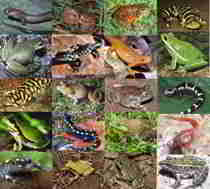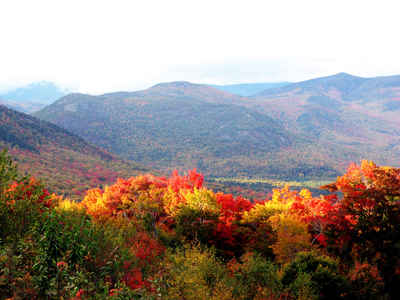New Hampshire State Amphibian
Spotted Newt 
(Notophthalmus viridescens)
Adopted on April 18, 1985
The Red Spotted Newt, (Notophthalmus v. viridescens,) was made New Hampshire state amphibian on April 18, 1985.
The spotted newt was designated the state amphibian in 1985 after a two year effort by high school students. Newts are very common to the region. With Goffstown science teacher Philip Browne and students at his side, Governor John Sununu signed House Bill 98 into law on April 18, 1985. The Spotted Newt became the "first" official state amphibian and the official state amphibian of New Hampshire. The Union Leader newspaper (April 25, 1985, p48) lists the newts as the "perfect symbol for ensuring ecology in New Hampshire as they exist predominantly in the rain and runoff sodden areas heavily affected by acid rain."
New Hampshire State Amphibian: Spotted Newt
 Small salamanders that live in both
aquatic and terrestrial ("eft") forms. The aquatic adult is olive green to greenish brown above, with a yellow, black spotted belly. The tail is flattened.
The land-living eft is reddish brown to bright red or orange, with a rounded tail. The skin appears rough, but is soft to the touch. Two subspecies
merge in Michigan: the Red-spotted Newt (N. v. viridescens) has two rows of black bordered red spots on the back. The smaller Central Newt (N. v. louisianensis)
may lack red spots, or may have red spots that lack black borders. Adult newts are 2.5 to 5.5 inches (6.4 to 14 cm) long.
Small salamanders that live in both
aquatic and terrestrial ("eft") forms. The aquatic adult is olive green to greenish brown above, with a yellow, black spotted belly. The tail is flattened.
The land-living eft is reddish brown to bright red or orange, with a rounded tail. The skin appears rough, but is soft to the touch. Two subspecies
merge in Michigan: the Red-spotted Newt (N. v. viridescens) has two rows of black bordered red spots on the back. The smaller Central Newt (N. v. louisianensis)
may lack red spots, or may have red spots that lack black borders. Adult newts are 2.5 to 5.5 inches (6.4 to 14 cm) long.
Habitat/Habits
Found state-wide, newts prefer small, permanent ponds, but also live in vernal ponds, sloughs, marshes, bogs, swamps and lake shallows. Efts are usually found in nearby woods, under rotting logs, rocks, and other shelters. Adults are active all year under water, but can hibernate on land if the pond dries up. Insects, worms, crustaceans, mollusks, other small invertebrates, and tadpoles are eaten. Their toxic skin secretions cause many fish to avoid eating them.
Breeding
Adults breed in late winter and early spring. Courtship is elaborate, with much nudging, twitching, and "tail fanning" by the male. Females attach
up to 300 single eggs to underwater plants or debris in April. In late summer, the gill breathing larvae may transform directly into the aquatic "adult"
stage or become "efts" that live on land for a year or two before returning to the water.
New Hampshire Revised Statutes
The law designating the purple finch as the official New Hampshire state bird is Section 3:16 (State Amphibian) of the New Hampshire Revised Statutes Title 1 (The State and Its Government) Chapter 3 (State Emblems, Flag, Etc) Section 3:16.
TITLE I
THE STATE AND ITS GOVERNMENT
CHAPTER 3
STATE EMBLEMS, FLAG, ETC.
Section 3:16
3:16 State Amphibian. - The spotted newt, Notophthalmus viridescens, is hereby designated as the official state amphibian of New Hampshire.
Source. 1985, 56:1, eff. June 23, 1985.
Taxonomic Hierarchy: Spotted Newt
Kingdom: Animalia
Phylum: Chordata
Class: Amphibia
Order: Caudata
Family: Salamandridae
Genus: Notophthalmus
Species: N. viridescens








